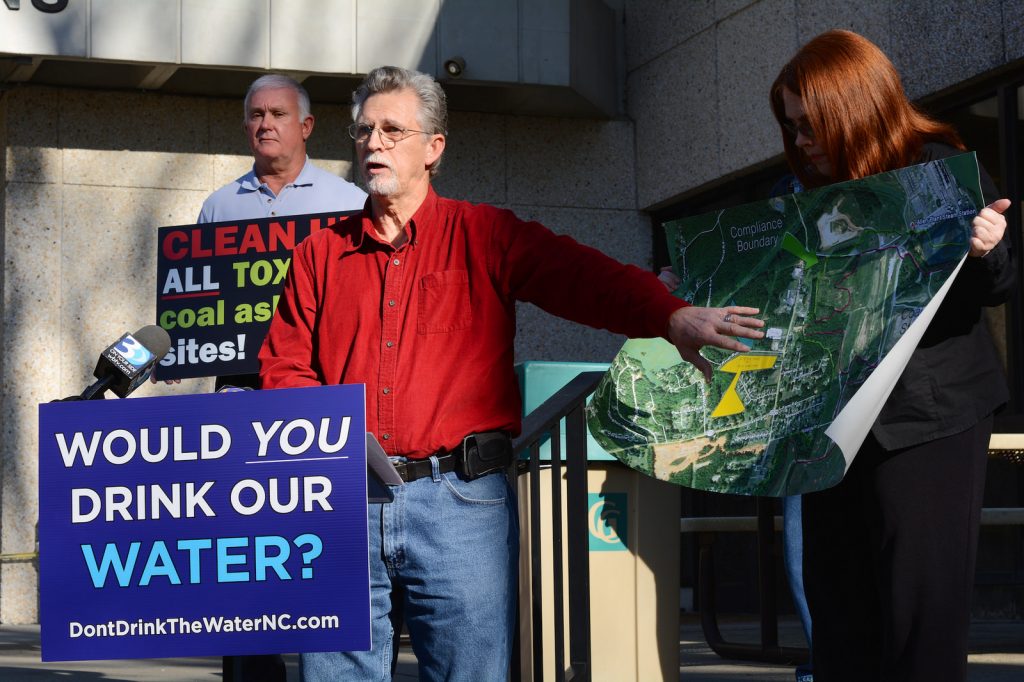Cleaning Up Coal Ash
For well over a century, power plants across the country have burned coal to generate electricity. And for just as long, leftover coal ash has been dumped in open, unlined pits near the power plant, usually located on a river or lake. Every year, U.S. power plants produce 130 million tons of coal ash, which is the second largest waste stream in the country after municipal garbage.
Coal ash concentrates the toxic heavy metals found in coal, including arsenic, mercury, lead and selenium. Stored in unlined, wet impoundments, coal ash has been leaking these toxics into our groundwater and surface waters for years. Sometimes these impoundments collapse — with disastrous results.
Yet government regulations for coal ash management are either non-existent or sparse, and there is little enforcement of the regulations that do exist. In North Carolina, this lack of oversight — and the complicity between state regulators, elected officials and Duke Energy — came to a boiling point in February 2014 when one of Duke’s coal ash impoundments spilled 39 million tons of ash into the Dan River.
Citizens living near North Carolina’s 33 coal ash impoundments — all of which have leaked — have fought for transparency from Duke and the state, and for cleanup of the pollution that threatens their property value, health and family. Their actions forced this issue into the headlines of news networks and to the forefront of environmental justice conversations in the United States.
Appalachian Voices stood with these communities as we worked for years to compel Duke Energy and the N.C. Department of Environmental Quality to excavate coal ash from all the North Carolina sites and dispose of it either in lined, dry landfills, away from waterways, or by recycling it for concrete or other uses, provided it’s done in a manner that protects public health and the environment.
On Jan. 2, 2020, North Carolina announced a historic settlement with one of the state’s most powerful corporations and polluters, Duke Energy. The settlement requires Duke to move nearly 80 million tons of toxic coal ash at six of its power plants to properly lined landfills onsite or recycle it.

Learn information about specific coal ash impoundments in the South, including health threats and safety ratings:
Additional Resources
Fact sheets, videos, links to academic research, and more
Sign Up to Act
Help us protect the health of our communities and waterways.
Latest News
Virginia Water Board to decide on fracked-gas pipelines
This week and next, the Virginia State Water Control Board will decide whether to allow pipeline companies to build the Mountain Valley and Atlantic Coast pipelines. Show up to add your comment and show opposition to these senseless projects!
Trump’s War on Reality
Special column adapted from the Front Porch Blog: Trump’s administration has set a dangerous precedent of relying on dishonesty and alternative facts instead of addressing the scientific truths behind coal and climate change.
EPA holds lone hearing on Clean Power Plan repeal
By holding only one public hearing for the proposed repeal of the Clean Power Plan, Scott Pruitt is once again working against the EPA’s mission of protecting human health and the environment.
Going solar in the coalfields of Southwest Virginia
CONTACT: Adam Wells, Appalachian Voices, New Economy Program…
Neighbors angered by latest coal ash news about Duke Energy
The latest news over Duke Energy’s handling of the coal ash crisis in North Carolina has many impacted citizens worried – but perhaps not shocked at the utility’s ongoing duplicity on the issue.
Hundreds to gather at Va. Capitol in unity for clean water, against fracked-gas pipelines
MEDIA ADVISORY FOR: December 2, 2017, 1:00 pm…










